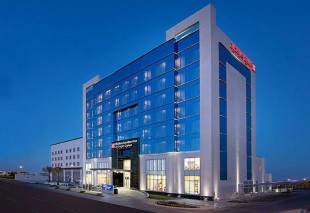

Analysis: Mid-market hotels in the region

The recent buzz surrounding mid-market hotels continues. The budget hotel segment reared its head a few years ago, but it’s only lately that it has made serious progress.
While Dubai has largely been the focus of new developments in this segment of late, panellists at The Hotel Show’s Vision Conference chaired by Christopher Hewett, associate director, TRI Consulting said that other emirates need mid-scale hotels as much as Dubai.
“Not just Dubai — Ras Al Khaimah can benefit from more options as well. It’s is a fantastic destination for those looking to do rock climbing and deep sea diving. Adventure enthusiasts yearn for mid-scale hotels and Ras Al Khaimah has a huge potential to cater to them,” said Daniel During, principal & managing director, Thomas Klein International.
But, there seems to be a contradicting hum in the air; a few experts revealed under anonymity to Hotelier Middle East that the recent mid-scale development buzz will do more harm than good to Dubai’s overall image.
These hoteliers believe Dubai’s positioning in the global hospitality sector is due to its luxurious hotels and resorts, and encouraging mid-market would undo what the emirate has achieved recently.
But the naysayers seem to be outnumbered, as operators and owners alike are firmly placing their faith in the rise of the millennial travellers flocking to the Middle East (who are attracted to mid-market brands), and as such, Dubai needs a healthy mid-market offering to attain its goal of attracting 20 million guests by 2020.
According to the panellists, millennial travellers will account for 75% of the world’s travel population in the next five years; these tourists will be looking to get the maximum out of their holidays, and more importantly, their buck.
“In the past, three-star and mid-market hotels in Dubai have been dodgy, but that trend is changing rapidly. The rise of savvy travellers to the emirate will ensure the growth and quality of the industry,” revealed Raki Phillips, SVP development, senior partner, INHOCO Group.
Additionally, mid-market and budget hotels are not going to challenge the five-star and upper scale hotels.
Mark Allaf, cluster general manager, Hilton Garden Inn summed it up: “The objective of Hilton Garden Inn is not taking market share away from our sister concern or competitors; we are simply offering an option to tourists.”
Hilton Worldwide believes highly in Dubai’s mid-market potential; earlier this year, the US-based hotelier signed an agreement with Wasl Hospitality and Leisure to open two additional mid-market properties in Dubai under its Hampton by Hilton and Hilton Garden Inn brands.
And at the time of going to press, a new 104-room Hilton Garden Inn Tabuk in Saudi Arabia was announced, showcasing the region’s potential for this sector.
A quick look at the data collated by Tophotelprojects revealed a total of 144 hotel projects are either in pre-construction or building phase in the Middle East. The number accounts for only the top 10 hotel brands worldwide. A glance at the brands reveals Hilton Garden Inn, Park Inn by Radisson, Hampton by Hilton and Holiday Inn make up the majority of the numbers, all of which are mid-market brands.
Interestingly, the talk of mid-market is only limited to three-star properties at the moment. At the Hotel Show, Hotelier quizzed several operators and independent owners to gauge their sentiment of one- and two-star offerings. They unanimously agreed that the time is not right at the moment.
However, a few mid-scale operators said that the boutique sector will emerge as a cherry on top of the mid-market cake. Instead of giving the aging, and in some cases crumbling, B&B offerings the bulldozer treatment, Philippe Harb, chief executive officer, One to One Hotels said they can be given the boutique hotel treatment: “Brands need to be young and vibrant; defining factors need to be in place to differentiate a boutique hotel from a mid-market hotel.”
“Some of the hotels in the historic areas of Bur Dubai and Deira have the potential to be refurbished and rebranded into boutique hotels. That way they save on the cost of buying land and building a new structure,” he added.
The conclusion seems to be that one- to three-star hotels will not kill the five-star and upper-upscale hotels. They will merely offer an alternative to travellers.
Spending lesser on accommodation will have a brilliant knock-on effect on the retail sector, as tourists will be left with surplus cash to spend on the city’s attractions rather than spending it all on hotel rooms.
Such is the importance and opportunity within the tourism sector that The Arabian Travel Market 2016 has chosen ‘mid-market travel’ as the official show theme, highlighting the potential impact this sector is likely to have in the future.